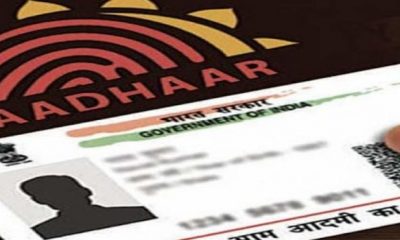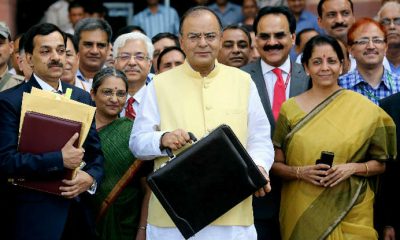National
Finance Minister assures Aadhaar data not to used to breach privacy

Finance Minister Arun Jaitley on Wednesday said that the Aadhaar Bill passed by the Lok Sabha last week includes strict guidelines to protect the privacy of every citizen of India.
The 12-digit biometric unique identification number around 980 million citizens have been enrolled for Aadhaar. The scheme whose work began under the leadership of Nandan Nilekani aims to enrol all eligible 1.1 billion residents by the end of 2016.
His response came in, after social activists criticised the Centre, saying the legislation may be misused for “mass surveillance”.
“The previous UPA government had also brought legislation on Aadhaar. In that bill, the purpose of the personal data and biometrics information collected through the exercise was not defined,” Jaitley said while introducing the bill in the Rajya Sabha.
Biometrics, considered the best way to establish a unique identity, is what Aadhar relies on. It uses the combination of fingerprints and retina scans, and accounts for situations where a resident may not have hands or eyes.
The new bill places restrictions on when and how the UIDAI can share data and notes that the biometric information – fingerprint and iris scans – will not be shared with anyone.
But the legislation gives the government sweeping powers to access the data for “efficient, transparent and targeted delivery of subsidies, benefits and services”, raising suspicions that the database could be used for surveillance.
The Aadhaar scheme is expected to help the government deliver benefits of major central schemes to the people, and the Centre says it save thousands of crores rupees.
“Both central and state governments give several subsidies to people. There are monetary assistances, cost rebates, subsidies etc. given which run into lakhs of crores of rupees. Now, these subsidies have to be quantified amounts given to identifiable sections,” Jaitley said.
Jaitley said the UPA’s bill was for the mere creation of a UID authority and that it was not a money bill, even though the Opposition has objected to the government’s move of converting the Aadhaar Bill into a money bill.
The Rajya Sabha, where the government does not have the numbers, has no role in passing a money bill. Once passed by the Lok Sabha, it becomes a law even if the Upper House does not return it within 14 days.
Although the Upper House can’t amend a money bill, it can recommend amendments, which can be accepted or rejected by the Lok Sabha.
In case amendments are recommended, the bill will remain pending unless the process is completed in the Lok Sabha.
National
Foodman Vishal Singh Honored for Hunger Free World Mission in Bangkok

Lucknow: Vishal Singh, a renowned social worker from Lucknow, also known as Foodman, has once again made India proud. He was honored by the Happy Hands Gloves Cooperative Limited Company in Korathai, Thailand, for his work with the Hunger Free World Mission.
The Hunger Free World Mission’s meeting was held in Korathai, Thailand, under Vishal Singh’s leadership. Representatives from several countries, including Mr. Raja Dwivedi (Managing Director of Happy Hands Gloves Limited), Thailand Coordinator Mr. Raja Mishra, and member Mr. Varun Singh, attended the event.

Under Vishal Singh’s leadership, the attendees took a pledge to work together toward creating a hunger-free world.
Speaking on the occasion, Vishal Singh explained that the main goal of the Hunger Free World Mission is social participation. He said the mission is not just about feeding people but also about meeting other basic needs of those who are struggling. The mission focuses on helping families of terminally ill patients in hospitals by providing food and shelter. It also works to fulfill essential needs like education, jobs, and care for the elderly.
For the last 16 years, the Vijay Sri Foundation has been providing free services, benefiting thousands of people. Vishal Singh highlighted that the mission aims to gain global recognition like other organizations such as WHO, WWF, and Red Cross, which work for social causes.
During this meeting, Vishal Singh was appointed as the Chairman of the Hunger Free World Mission by representatives from various countries. They also discussed holding regular meetings in different countries to push the mission forward.
Business tycoon Dr. Abhishek Verma has also supported this humanitarian mission, vowing to promote the idea of “Seva Parmo Dharma” (Service is the highest duty) worldwide. Vishal Singh praised him, stating that people like Dr .Abhishek Verma inspire others to work for the betterment of society.
Recently, Romania’s Ambassador, Mr . Daniela Sezonov Ţane, invited Vishal Singh to the Romanian Embassy in Delhi, where they discussed the mission in detail. Impressed by his humanitarian work, she honored Vishal Singh and invited him to Romania to take the mission forward .
Food man Vishal Singh has been serving the people of India for the past 16 years. Through the Vijay Sri Foundation, he provides free meals to cancer patients & their families ,shelter, and education for women & children along with running free old-age homes in Lucknow.
In addition to his humanitarian work, Vishal Singh also addresses issues like crime and corruption through his role as Chairman of Seva Path Media and Managing Director of Vijay Sri Foundation.

During the COVID-19 pandemic, Vishal Singh and his team worked tirelessly to provide food and help to the needy, including starving children, elderly citizens, and pregnant women. Despite contracting the virus himself, he continued to assist others after his recovery. He even created a life-saving oxygen regulator using household items, which was praised by doctors both in India and abroad.
In his address at the meeting, Vishal Singh spoke about his mission to create a hunger-free world. He pointed out that India’s large population, along with issues like unemployment and poverty, has caused the country to fall on the Hunger Index. He urged people to contribute just one handful of grains daily to help create a hunger-free world.
He concluded by saying that through social participation, we can empower the people around us, meet their basic needs, and work together to build a stronger, more prosperous, and developed society.
























